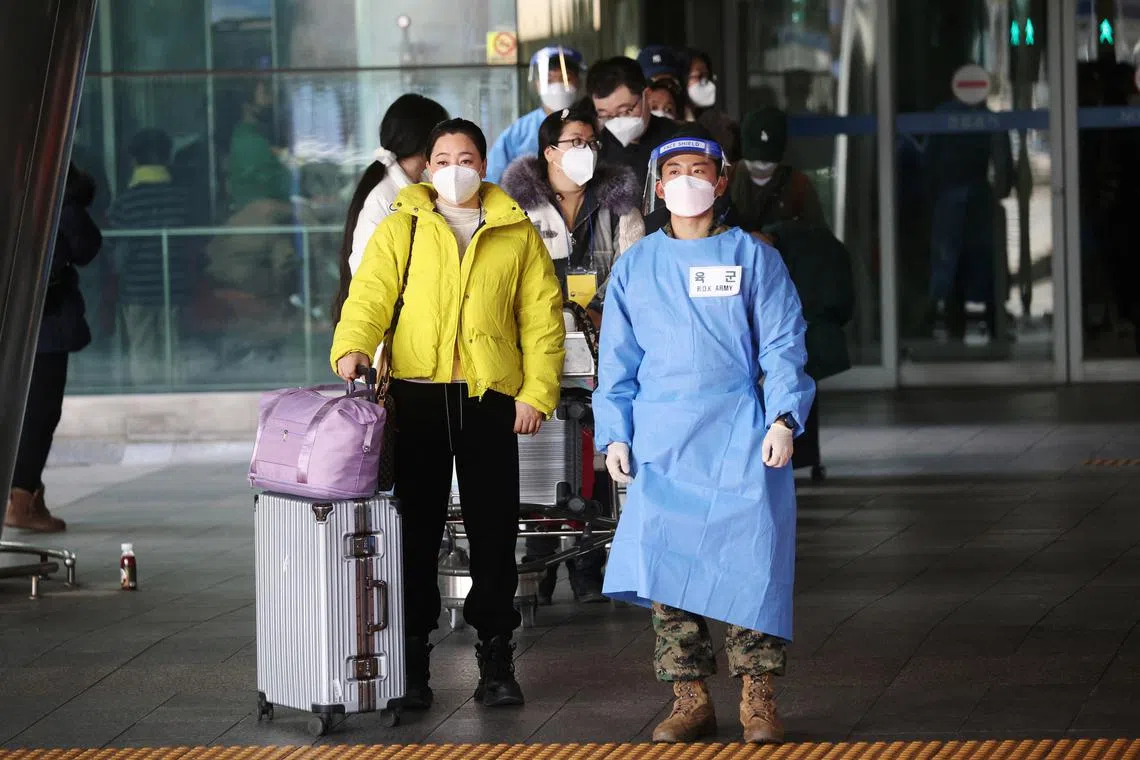China retaliates by suspending visas for South Korea and Japan
Sign up now: Get insights on Asia's fast-moving developments

The embassy will adjust the policy subject to the lifting of South Korea’s “discriminatory entry restrictions” against China.
PHOTO: REUTERS
Follow topic:
BEIJING - In its first retaliatory move, China has hit back at South Korea and Japan for what it calls “discriminatory” travel curbs by suspending the issuing of short-term visas to travellers from these two countries.
Its embassy in Seoul said on Tuesday that it will stop giving visas to South Koreans seeking to visit China for tourism, business, medical treatment, transit and personal matters, and will only lift the ban if Seoul rows back its “discriminatory entry restrictions” against China.
South Korea had on Dec 30 said it would join other countries such as Japan and the United States in requiring travellers from mainland China to produce a negative Covid-19 test taken within 48 hours of their departure time, and to undergo testing on arrival. It also restricted short-term visits by Chinese nationals and halted expanding the number of flights from China as Covid-19 spreads unabated across the country of 1.4 billion people.
In Japan, Kyodo news agency, citing industry sources, said on Tuesday that travel agents have been notified that Chinese visas for Japanese travellers have also been suspended.
Although China imposes similar testing requirements for all arrivals, Chinese Foreign Ministry spokesman Wang Wenbin said on Tuesday that Beijing was “firmly opposed to the discriminatory entry restrictions imposed by a few countries on China” and will take “reciprocal measures”.
China faces travel restrictions imposed by nearly a dozen countries after it dismantled its zero-Covid policy and reopened borders. The countries also include India, Canada, Australia, France, Italy, Spain and Sweden.
Singapore said it will not take measures against Chinese travellers as they have so far accounted for only less than 5 per cent of all imported cases. Between 700 and 1,000 people travel from China to Singapore daily, Health Minister Ong Ye Kung said on Monday.
Tuesday’s announcement comes after newly minted Foreign Minister Qin Gang spoke to his South Korean counterpart Park Jin on Monday, urging Seoul to adopt an “objective and scientific attitude” towards its Covid-19 policy.
South Korean Foreign Ministry spokesman Lim Soo-suk expressed regret over China’s retaliatory action, defending his country’s measures as “based on scientific and objective grounds”.
Countries that have introduced travel curbs against China said they are worried about new variants emerging as Covid-19 rages across Chinese provinces from Anhui to Zhejiang, and also accuse China of a lack of transparency over its Covid-19 data.
Beijing has stopped releasing infection numbers as it has downgraded the severity of the disease and no longer requires positive cases to seek treatment. It has also narrowed the definition of a Covid-19 death to one caused only by respiratory failure brought on by the virus.
Public health experts have projected that China could face as many as two million deaths because of its vaccination gap and the population’s lack of immunity.
Just 40 per cent of those over the age of 80 have had a booster shot, and only 76.6 per cent have received at least one jab.
Health officials have acknowledged that they have to boost healthcare resources, especially in the underserved rural areas, to avoid a crisis. The Henan Health Commission on Monday said that 89 per cent of the central province’s 99-million population have been infected. As many as 90 per cent of them live in rural areas.
As millions travel home during the Chinese New Year peak period, another wave of infections is expected.
While much of the world adapted to the realities of Covid-19 and gradually opened up, China had hung on to its zero-tolerance policy for much of the past three years by shutting its borders, imposing two- to three-week quarantine periods for those entering the country and resorting to flash lockdowns and mass testing to wipe out the spread of the virus.
The World Health Organisation said on Tuesday that it did not expect the tsunami of infections in China to significantly impact the situation in Europe.
The UN health body’s Europe director Hans Kluge told reporters that while it was not unreasonable for countries to take measures to protect their citizens, these protocols should be “rooted in science... be proportionate and non-discriminatory”.
But he also warned that the region “cannot be complacent”.


